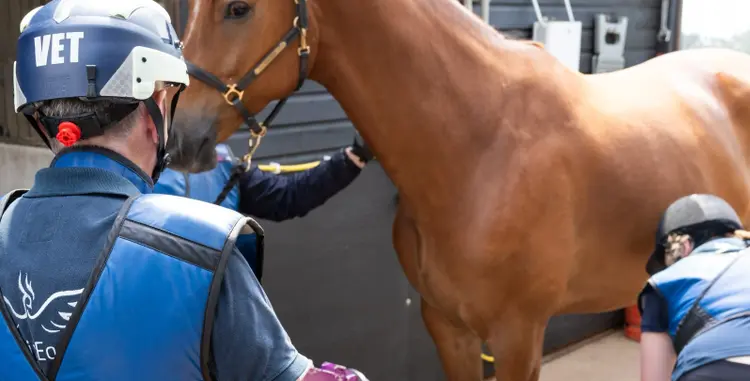
Key Stakeholders unite to advance helmet design for equine veterinary professionals
A landmark meeting held last week brought together a diverse group of stakeholders from across the equine veterinary sector to address a critical issue: the safety of veterinary professionals who work with horses.
The meeting brought together veterinarians, veterinary nurses, yard managers, practice leaders, researchers, and Health & Safety experts from CVS Equine and the University of Liverpool, alongside representatives from Uvex, a leading manufacturer of helmets for sports and industrial safety.
The meeting was convened in response to recent research led by Dr. John Tulloch, funded by CVS Group, which highlighted the high risk of injury faced by equine vets and nurses. The study, published in Preventive Veterinary Medicine, revealed alarming statistics around head injuries sustained during routine equine care, prompting CVS to take decisive action. As a result, the company has now made it mandatory for all employees handling horses to wear protective helmets.
While staff are currently able to choose from a range of helmet designs - including riding helmets and headwear used by emergency services - none have been specifically engineered for the unique demands of equine veterinary practice. This gap in design and functionality has sparked a collaborative effort to explore what a truly effective and practical helmet for veterinary professionals should look like, what the differing safety tests are and what helmets are currently available which may meet these requirements and be adapted for use within the veterinary industry.
During the session, frontline professionals shared their experiences and challenges with current helmet options. Discussions centred around the need for helmets that balance safety, comfort and practicality, such as the ability to attach accessories such as head torches and visors.
Rob Jones and Luke Cannavan from Uvex then delivered an informative presentation on the science of helmet safety, including impact resistance, fit, ventilation and material innovation. Their input helped broaden the group’s understanding of what is possible in terms of design and how existing PPE helmets might be adapted to meet the needs of veterinary teams.
Uvex’s expertise in high-performance head protection provided valuable insight into the rigorous standards and testing protocols that underpin helmet design.
Beyond the technical aspects, the meeting also addressed the cultural shift required to normalise helmet use in equine veterinary settings. Participants explored strategies to overcome resistance, promote adoption and embed safety as a core value within the profession.
Sophie Ignarski, Equine Director at CVS, said:
The group agreed that collaboration between veterinary professionals, researchers, and manufacturers is essential to develop a helmet that meets both safety standards and the practical realities of the equine veterinary industry. The next steps will involve further consultation and trials of different types of PPE helmets and accessories, with the goal of offering a helmet choice that is not only protective but also widely accepted and adopted across the industry.
CVS Equine provides a complete range of industry-leading veterinary services at 21 sites across the UK as well as its out of hours clinical and call answering services, Equicall and Equicomms. Its ambulatory veterinary surgeons are supported by a team of over 20 recognised Veterinary Specialists in internal medicine, surgery, dentistry, sports medicine, reproduction and diagnostic imaging based within a network of referral centres. The division offers a multi-disciplinary approach, along with the latest veterinary treatments, diagnostic services, advice, standards and support – as a result of unrivalled investment in people, equipment, facilities and research. Visit the CVS Equine website for more information. You can also access the full article detailing Dr Tulloch's research.